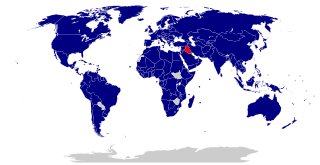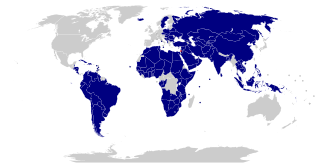
The foreign policy of Denmark is based on its identity as a sovereign state in Europe, the Arctic and the North Atlantic. As such its primary foreign policy focus is on its relations with other nations as a sovereign state compromising the three constituent countries: Denmark, Greenland and the Faroe Islands. Denmark has long had good relations with other nations. It has been involved in coordinating Western assistance to the Baltic states. The country is a strong supporter of international peacekeeping. Danish forces were heavily engaged in the former Yugoslavia in the UN Protection Force (UNPROFOR), with IFOR, and now SFOR. Denmark also strongly supported American operations in Afghanistan and has contributed both monetarily and materially to the ISAF. These initiatives are a part of the "active foreign policy" of Denmark. Instead of the traditional adaptative foreign policy of The unity of the Realm, Kingdom of Denmark is today pursuing an active foreign policy, where human rights, democracy and other crucial values is to be defended actively. In recent years, Greenland and the Faroe Islands have been guaranteed a say in foreign policy issues, such as fishing, whaling and geopolitical concerns.

A diplomatic mission or foreign mission is a group of people from a state or organization present in another state to represent the sending state or organization officially in the receiving or host state. In practice, the phrase usually denotes an embassy, which is the main office of a country's diplomatic representatives to another country; it is usually, but not necessarily, based in the receiving state's capital city. Consulates, on the other hand, are smaller diplomatic missions that are normally located in major cities of the receiving state. As well as being a diplomatic mission to the country in which it is situated, an embassy may also be a nonresident permanent mission to one or more other countries.

In the 19th century France built a new French colonial empire second only to the British Empire. It was humiliated in the Franco-Prussian War of 1870–71, which marked the rise of Germany to dominance in Europe. France allied with Great Britain and Russia and was on the winning side of the First World War. If it was initially easily defeated early in the Second World War, Free France, through its Free French Forces and the Resistance, continued to fight against the Axis powers as an Allied nation and was ultimately considered one of the victors of the war, as the allocation of a French occupation zone in Germany and West Berlin testifies, as well as the status of permanent member of the United Nations Security Council. It fought losing colonial wars in Indochina and Algeria. The Fourth Republic collapsed and the Fifth Republic began in 1958 to the present. Under Charles De Gaulle it tried to block American and British influence on the European community. Since 1945, France has been a founding member of the United Nations, of NATO, and of the European Coal and Steel Community. As a charter member of the United Nations, France holds one of the permanent seats in the Security Council and is a member of most of its specialized and related agencies.

Since 1980, the foreign relations of Iraq have been influenced by a number of controversial decisions by the Saddam Hussein administration. Hussein had good relations with the Soviet Union and a number of western countries such as France and Germany, who provided him with advanced weapons systems. He also developed a tenuous relation with the United States, who supported him during the Iran–Iraq War. However, the Invasion of Kuwait that triggered the Gulf War brutally changed Iraq's relations with the Arab World and the West. Egypt, Saudi Arabia, Syria and others were among the countries that supported Kuwait in the UN coalition. After the Hussein administration was toppled by the 2003 U.S. invasion, the governments that succeeded it have now tried to establish relations with various nations.

The foreign relations of North Korea – officially the Democratic People's Republic of Korea (DPRK) – have been shaped by its conflict with South Korea and its historical ties with world communism. Both the government of North Korea and the government of South Korea claim to be the sole legitimate government of the whole of Korea. The Korean War in the 1950s failed to resolve the issue, leaving North Korea locked in a military confrontation with South Korea and the United States Forces Korea across the Demilitarized Zone.
Joseph Milton Bernstein was an American accused of spying for the Soviet Union and later confirmed as a Soviet agent by the US intelligence program Venona.
Philip Olin Keeney (1891–1962), and his wife, Mary Jane Keeney, were librarians who became part of the Silvermaster spy ring in the 1940s.

Bulgaria–Russia relations are the diplomatic relations between the countries of Bulgaria and Russia.

The Republic of Bulgaria is a country in Southeast Europe, and a member of both NATO and the European Union. It maintains diplomatic relations with 181 countries.

Foreign relations exist between Australia and Estonia. Australia first recognised Estonia on 22 September 1921. Australia was among the first countries to re-recognise Estonia's independence on 27 August 1991. Both countries re-established diplomatic relations on 21 November 1991.

Bilateral relations exist between Azerbaijan and Canada. Both nations are members of the United Nations.

The Embassy of the United States of America in Tehran was the American diplomatic mission in the Imperial State of Iran. Direct bilateral diplomatic relations between the two governments were severed following the Iranian Revolution in 1979, and the subsequent seizure of the embassy in November 1979.

Diplomacy comprises spoken or written communication by representatives of states intended to influence events in the international system.

Washington Bookshop, also known as the Washington Cooperative Bookshop, was a World War II-era bookstore in Washington, DC, at 916 17th St NW. It was established in 1938 as a cooperative. Its 1200 members were able to purchase books from this bookshop at a special discounted rate; there were also an art gallery and a lecture space where evening events were held. Lectures held at the store included a 12-week series of lectures on anthropology by Paul Radin; Eleanor Roosevelt also spoke to the bookshop's members. The store also had its own string quartet. Considered one of the best bookstores in Washington, it closed in 1950.

The foreign relations of the State of Palestine have been conducted since the establishment of the Palestine Liberation Organization (PLO) in 1964. In November 1988, the PLO's Palestinian National Council declared the independence of the State of Palestine and in 1994 the PLO established the Palestinian National Authority (PNA) following the Oslo Accords. The PLO Executive Committee performs the functions of the government of the State of Palestine. Currently, the PLO maintains a network of offices in foreign countries and also represents the PNA abroad.

Foreign relations exist between Australia and Latvia. Australia first recognised Latvia on 22 September 1921 and was among the first countries to re-recognise Latvia's independence on 27 August 1991. Both countries re-established diplomatic relations on 21 November 1991. Australia is represented in Latvia through its embassy in Stockholm, Sweden and an honorary consulate in Riga. Latvia has had an embassy in Canberra since October 2021, and also has honorary consulates in Sydney, Brisbane, Adelaide, Melbourne and Perth.

Foreign relations exist between Australia and Lithuania. Australia was among the first countries to re-recognise Lithuania's independence on 27 August 1991. Both countries formally established diplomatic relations on 6 November 1991. Australia is represented in Lithuania through its embassy in Warsaw, Poland and an honorary consulate in Vilnius. Lithuania has had an embassy in Canberra since 2021, and also has honorary consulates in Sydney, Adelaide, Melbourne and Darwin.















